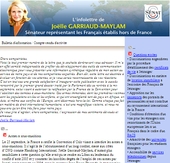 Senior MP: Recognition Of Iran’s N. Rights By G5+1 First Step Towards Reciprocal Trust
Senior MP: Recognition Of Iran’s N. Rights By G5+1 First Step Towards Reciprocal Trust
World News Connection
Thursday, October 24, 2013 – 09:29 UTC -0400
TEHRAN (FNA)- Chairman of the Iranian Parliament’s National Security and Foreign Policy Commission Alaeddin Boroujerdi reiterated that Tehran will not compromise its nuclear rights, and underlined that recognition of the Iranian nation’s nuclear rights by the Group 5+1 (the five permanent UN Security Council members plus Germany) is the first confidence-building step needed for future agreements. « The recognition of the Islamic Republic of Iran’s right to acquire peaceful nuclear energy forms the basis for any agreement with the P5+1, » the Iranian parliamentarian said in a meeting with French senators Joelle Garriaud-Maylam and Jean-Yves Leconte in Tehran on Wednesday.
The two French senators left Paris for Tehran in early hours of Wednesday to confer with senior officials here on ways of bolstering mutual cooperation between the two countries.
Iran and the six world powers agreed in their third session of talks on October 15 to follow up on the nuclear negotiations on November 7 and 8.
At the end of the negotiations, EU Foreign Policy Chief Catherine Ashton hailed the nuclear negotiations as the « most detailed » and most « substantive » ones ever held between the two sides.
Washington and its western allies accuse Iran of trying to develop nuclear weapons under the cover of a civilian nuclear program, while they have never presented any corroborative evidence to substantiate their allegations. Iran denies the charges and insists that its nuclear program is for peaceful purposes only.
Tehran stresses that the country has always pursued a civilian path to provide power to the growing number of Iranian population, whose fossil fuel would eventually run dry.
Despite the rules enshrined in the Non-Proliferation Treaty (NPT) entitling every member state, including Iran, to the right of uranium enrichment, Tehran is now under four rounds of UN Security Council sanctions and the western embargos for turning down West’s calls to give up its right of uranium enrichment.
Tehran has dismissed West’s demands as politically tainted and illogical, stressing that sanctions and pressures merely consolidate Iranians’ national resolve to continue the path.
Tehran has repeatedly said that it considers its nuclear case closed as it has come clean of the International Atomic Energy Agency (IAEA)’s questions and suspicions about its past nuclear activities.





